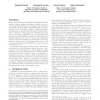Free Online Productivity Tools
i2Speak
i2Symbol
i2OCR
iTex2Img
iWeb2Print
iWeb2Shot
i2Type
iPdf2Split
iPdf2Merge
i2Bopomofo
i2Arabic
i2Style
i2Image
i2PDF
iLatex2Rtf
Sci2ools
178
click to vote
VLDB
2007
ACM
2007
ACM
Fast Data Anonymization with Low Information Loss
Recent research studied the problem of publishing microdata without revealing sensitive information, leading to the privacy preserving paradigms of k-anonymity and -diversity. k-anonymity protects against the identification of an individual's record. -diversity, in addition, safeguards against the association of an individual with specific sensitive information. However, existing approaches suffer from at least one of the following drawbacks: (i) The information loss metrics are counter-intuitive and fail to capture data inaccuracies inflicted for the sake of privacy. (ii) -diversity is solved by techniques developed for the simpler k-anonymity problem, which introduces unnecessary inaccuracies. (iii) The anonymization process is inefficient in terms of computation and I/O cost. In this paper we propose a framework for efficient privacy preservation that addresses these deficiencies. First, we focus on one-dimensional (i.e., single attribute) quasiidentifiers, and study the prope...
Related Content
| Added | 05 Dec 2009 |
| Updated | 05 Dec 2009 |
| Type | Conference |
| Year | 2007 |
| Where | VLDB |
| Authors | Gabriel Ghinita, Panagiotis Karras, Panos Kalnis, Nikos Mamoulis |
Comments (0)

